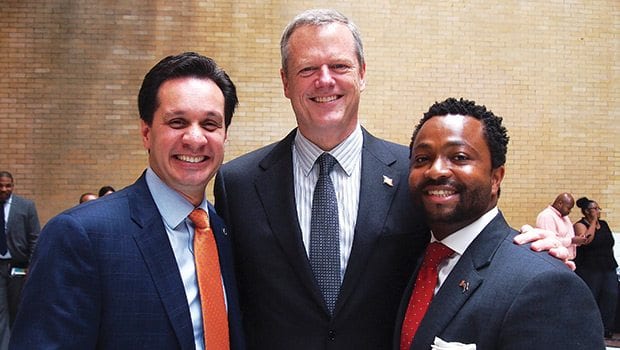Cape Verdeans mark 40 years of independence
Legislators, diplomats attend State House event

As the sunrise of Cape Verde’s first day of independence from Portuguese colonial rule approached, 16-year-old Gunga Tolentino, her mother and her sister were still awake, feverishly sewing the first Cape Vedean flag to fly over the capital city of Praia.
One of her brothers had been fighting for independence on the African mainland in Guinee Bissau. Another brother, Luis Tolentino, had been shipped away to a Portuguese prison in Angola.

State Rep. Evandro Carvalho, Ambassador Jose Luis Rocha, Consul General Pedro Carvalho and Cultural Attache Gunga Tavares cut a cake commemorating the 40th anniversary of Cape Verde’s independence.
“They sent you there to either survive or die,” Gunga remembers.
Luis had designed the flag, with blocks of the red, green and yellow colors popular with African liberation movements in the ‘60s and ‘70s. While Tolentino family members were worried for the missing brothers, the excitement of the country’s liberation at least temporarily eclipsed any feelings of fear.
“It was pure jubilation,” recalls the now married Gunga Tavares. “It was out of this world. We were heavily involved in the movement for independence and against the abuses of the Portuguese.”
Last week, Tavares and more than 100 other Cape Verdeans gathered at the State House to mark the 40th anniversary of the July 5, 1975 independence day. There, state Sen. Vinny deMacedo (R-Plymouth) and state Rep. Evendro Carvalho (D-Dorchester) led a program that featured speeches by Cape Verdean Ambassador to the U.S. Jose Luis Rocha, Consul General Pedro G. Carvalho and Gov. Charlie Baker.
Rocha focused his speech on the remarkable progress Cape Verde has made in the years since independence. Long neglected by the Portuguese, Cape Verde had just two high schools and a per capita gross national product of just $190 per year.
“The economy grew steadily and more diverse, mainly in the tourism sector, to allow a gross national product today estimated above 4,000 U.S. dollars,” said Rocha. “The human and social development gave way to a new Caboverdean man and woman with more opportunities and access to health, education, housing and culture.”
African independence movement
The Cape Verde islands were first settled by the Portuguese in the 15th century. During the trans-Atlantic slave trade, the islands served as a transshipment center for human cargo. In the post-slavery years, ships continued to use the islands to re-supply. With few natural resources and little investment from Portugal, the islands remained neglected with little infrastructure. At the time of independence, the 10-island archipelago had just two health clinics and no major hospitals.
In the 1950s and ’60s as Africans began armed struggles against colonial rule, Cape Verdean nationalists joined forces with freedom fighters in the neighboring Portuguese colony of Guinee Bissau, forming the African Party for the Independence of Guinee and Cape Verde (PAIGCV). That party coordinated military strategy and shared resources with the liberation movements in Portuguese-held Angola and Mozambique.

Desiree Fernandes sings the Cape Verdean national anthem while state Rep. Evendro Carvalho listens.
Because Cape Verde has little tree cover and its population is spread over 10 islands, no significant armed struggle took place on Cape Verdean soil. Most Cape Verdean fighters, including PAIGCV leader Amilcar Cabral, fought the Portuguese in Guinee. Backed by support from Cuba, the Soviet Union and China, which supplied munitions, the African fighters declared independence in Guinee in 1974. In December of that year, Portugal agreed to turn over control of Cape Verde to a transitional government. In 1975, a newly-elected Cape Verdean national assembly declared independence on July 5.
While many of those assembled at the State House participated in the Cape Verdean struggle for independence, others, like Rep. Carvalho, were born in the post-independence era.
“I was born independent,” said Carvalho, who was born in 1981. “It was wonderful to grow up in the time it did. I didn’t live through the oppression, but I grew up with the new freedom.”
The freedom those on the island won in 1975 came with significant challenges. With frequent droughts and an under-developed economy, the path to success for most Cape Verdeans had long been to leave the islands for the United States, Senegal or Europe. Emigration continued in the post-independence years.
The remittances sent by Cape Verdean immigrants to their families in the archipelago have given a significant boost to the economy there. Even more so, a thriving tourism industry has generated revenue to help the nation of 525,000 develop 50 new schools, two major hospitals and smaller clinics on each island. Literacy in Cape Verde has jumped from just 40 percent at independence to 97 percent today.
“The progress this small nation has made in the last 40 years is phenomenal,” said Sen. deMacedo.
As for progress in the United States, deMacedo’s election to the state Senate last year stands as one high water mark. And with the election of Carvalho, who joined the House last year in a special election, the Cape Verdean delegation on Beacon Hill has doubled its numbers, deMacedo pointed out.
“Now we have two.”
More significantly, other legislators and the governor turned out to the event, a sign of the growing clout Cape Verdeans enjoy on Beacon Hill.
“Whether you celebrate independence on July 4 or July 5, whether you’re 239 years old or 40 years old, it all feels pretty good, doesn’t it?” said Gov. Charlie Baker.







